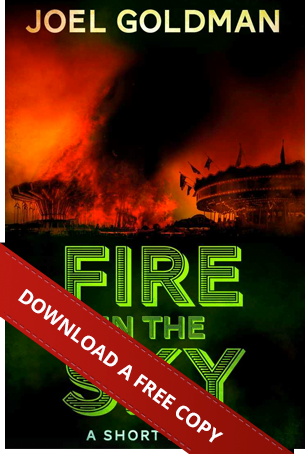Writing Habits
The third video from ‘A Personal Journey’
The third video in the series ‘A Personal Journey’ – Joel Goldman tells us about his routine and writing habits in crafting the perfect crime thriller.
Episode 3 Transcript – Writing Habits
Masterpiece writing 101
Writers will tell you that they’re divided into two camps. There are those who outline everything, every scene, every chapter – beginning to end before they write and they don’t deviate from that. I thought I was going to be that kind of a writer because I was that kind of a lawyer getting ready for trial. But I found it didn’t work for me at all. So I start out and I know generally what the story is about. I have a pretty good idea who the bad guy is. And then I start the action. I clap my hands – ACTION – and things start to happen.
Sometimes you don’t know where you’re going until you get there
Some of the best moments are when I’m surprised as I’m writing. I’m typing away. I’m looking at the screen. And all of the sudden I’m off going somewh … And I think, ‘Man – how did that happen?’
That to me is some of the highest, greatest moments of the writing process – when those magical moments happen.
There are stories everywhere. You just have to pay attention
The world is so rich. Our lives are so rich that if you’re paying attention you can find something to write about. I pay attention. I pay attention to what’s going on around me in the world – stories I see in the news, in the newspaper, online. And I think I can use that.
In each book, in each series …
It’s all about the characters and what’s going on in their lives
I start with the characters … I can explore the development of these characters over a period of time and how they’re impacted by what happened in earlier books. And I think readers love that. I know I as a reader – I love that.
I wanted to see what happened to these people. So, I’m interested in that, and that drives the plot.
The creative process has to be organic
I like letting my mind wander. … I can’t sit down at the keyboard and command myself to be brilliant. … And the discipline is to let your mind wander because it will stop at all different kinds of places. And that’s where a lot of stuff comes to me.
A good result requires tough minded editing
Everything in … a novel, it either has to serve plot or character or both. If it doesn’t do one of those things than it’s just gratuitous fluff and it needs to be out of the book.
One of the hardest parts of being a good writer is being a good critical self editor … because every word you write is brilliant. Every turn of the phrase is iconic. You have to do hand to hand combat with every word on the page so that you can justify why that word is there and why it is where it is. … How does it serve what you’re doing and is there a better way to say it.
A good day of writing? About 1,000 words
From a word count standpoint, a good day of writing to me is 1,000 words. Because each day when I start out I review what I did the day before. And I’m going to edit that and then add on to that. So the 1,000 words is the new stuff preceded by the editing of the previous day’s work.
I can write at the kitchen table. I can write at Starbuck’s. I can write in my office in the basement. But a writer has to write.
Laundry. Medical appointments. Grocery shopping. Business obligations. TICS. Exhaustion.
Life gets in the way more than I would like. And my biggest struggle right now is to keep enough of this stuff at bay so that I really can write every day. Because that’s when I’m at my best and that’s when I’m happiest.



